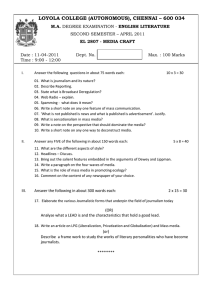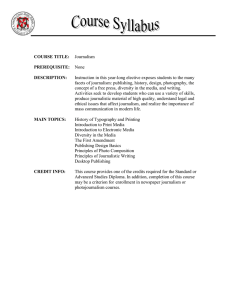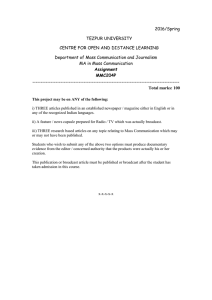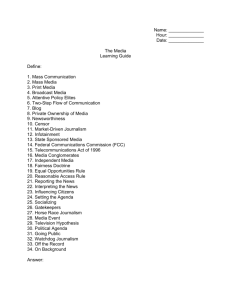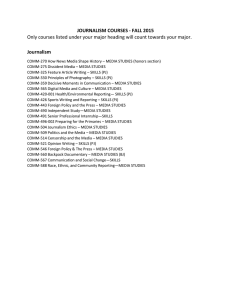WRITING 107J Journalism and News Writing CURRICULAR GUIDELINES
advertisement
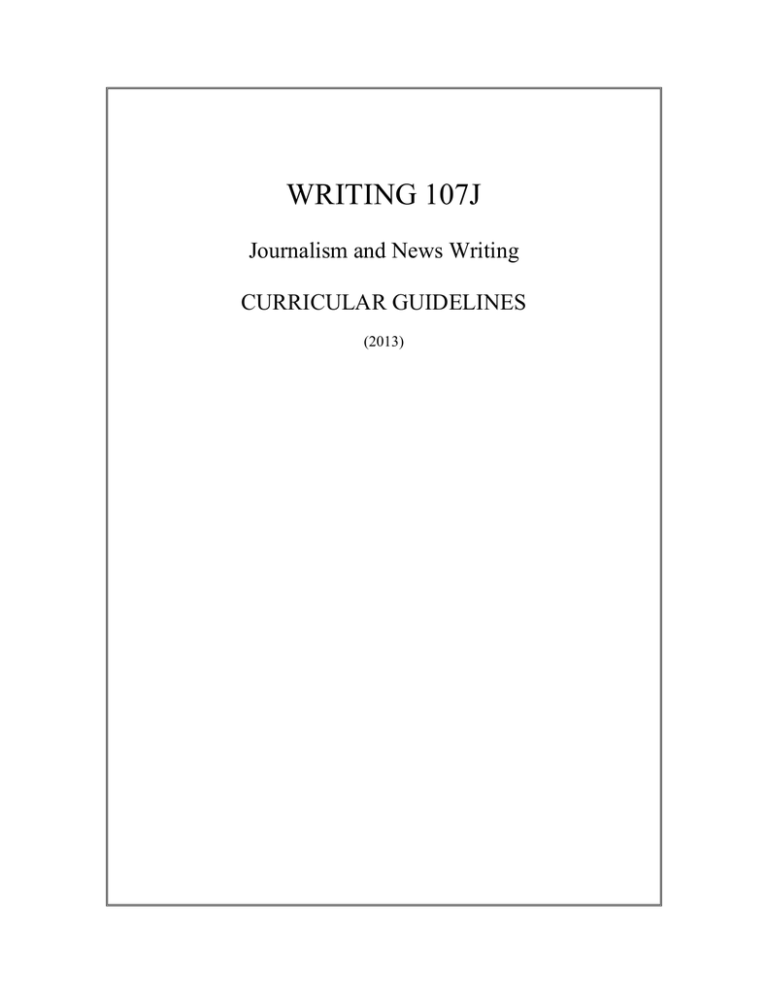
WRITING 107J Journalism and News Writing CURRICULAR GUIDELINES (2013) COURSE TITLE Writing 107J: Journalism and News Writing PREREQUISITES Writing 2, 2LK, 2E, or equivalent; upper-division standing. CATALOG DESCRIPTION Analysis and practice of news writing for print and broadcast, and new media with a focus on inverted pyramid style, interview techniques, background research, editing, writing to deadline, and ethical issues. COURSE DESCRIPTION Writing 107J is a gateway journalism class specifically designed for students taking Communications courses, who are planning to enter journalism graduate school, or who wish to pursue a career in the media, or who are interested in learning more about writing for print, broadcast, and new media. The class focuses on the analysis and writing of news tailored to specific audiences and introduces the basic strategies of media writing. Students will be required to perform analysis of the news from a variety of news media sources. The majority of formal writing assignments are built around a published study that each student selects and include writing a hard news story, a feature, and a longer article that is adapted for broadcast. Workshops and lectures will address the journalistic characteristics of clarity, conciseness, and correctness. Other topics examined are interviewing, attribution, writing to word count, revising, working to deadline, and obtaining accurate, ethical information. CURRICULAR PREMISES AND PARAMETERS Writing 107J encourages students to focus on the audience, purposes, and strategies of effective journalistic writing. For many students, this is the first time they have been exposed to the news, so analysis of newsworthiness is critical to the curriculum. Students must learn to recognize and understand the rhetorical strategies of leads and news story styles, which include the inverted pyramid and feature style writing. To do so, students identify and characterize appropriate audiences; define primary and secondary purposes; learn basic interviewing skills; and learn the value of clear, conversational, concise style. Since reporting news requires research, students practice methods for navigating various databases and conducting field inquiry. COURSE REQUIREMENTS Texts Students must read news stories from a variety of online, print, and broadcast sources. A news writing and reporting textbook should complement class lectures. Additionally those teaching the course may wish to include an instructor-designed course pack and/or the AP Style Guide. Assignments Student assignments may include news stories in inverted pyramid style, short feature articles, in-depth articles, broadcast copy, new media formats, and timed writings. The course may conclude with a news story presented as a broadcast or delivered in a variety of media. Examinations and Grading Examinations are optional but might include a midterm that focuses on correctness in journalism or proper use of quotations and attribution. The instructor will grade individual assignments. OUTCOMES After taking Writing 107J, students should: Recognize and analyze journalistic formats and organizational strategies Understand specialized terminology of journalism Understand how evidence is typically used in journalistic settings to support objectivity Access secondary source materials using a range of resources, including specialized professional journals and databases, websites, and popular literature for critical analysis Conduct interviews with primary sources and obtain information to cite through paraphrase, summary, and direct quotation Understand the differences between primary and secondary research, and recognize the appropriate application of each in journalism Compose one or more research papers that cite and document sources using attribution, accurate reporting, and proper use of quotations Produce a series of shorter texts that demonstrate typical content, formats, and stylistic conventions in journalism Tailor writing to meet the requirements of lay audience Translate complex writing into clear, concise language Practice writing under deadline
